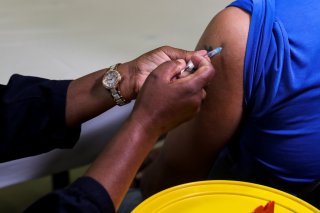Study: Vaccine Protection Against Omicron Drops to 33 Percent
Gavin Screaton, head of Oxford University’s Medical Sciences Division and lead author of the paper, noted that the findings should “press home the message that those who are offered booster vaccination should take it.”
A new large-scale study out of South Africa has found that a two-dose regimen of the Pfizer-BioNTech vaccine provides just thirty-three percent protection against infection by the new and highly mutated Omicron coronavirus variant.
However, the research, conducted by researchers at Discovery Health, South Africa’s largest private health insurer, and the South African Medical Research Council, did reveal that the vaccine still offers seventy percent protection against hospitalization.
The analysis was based on more than two hundred ten thousand COVID-19-positive test results, of whom forty-one percent had received two doses of the Pfizer vaccine. Nearly eighty thousand of the positive COVID-19 test results were attributed to Omicron infections.
Largely due to the variant, South Africa has witnessed rapid community spread over the past three weeks. The seven-day rolling average of daily new cases in the country surged from 8.07 new cases per one hundred thousand people on November 29 to 34.37 new cases per one hundred thousand people on December 13, according to the latest data compiled by Johns Hopkins University. The death rate, however, has remained steady during that same period.
“Superb genetic surveillance by the Network for Genomic Surveillance in South Africa identified that Omicron infection accounts for over 90 percent of new infections in South Africa, and has displaced the formerly dominant Delta variant,” said Discovery Health CEO Dr. Ryan Noach, per The Associated Press.
“The Omicron-driven fourth wave has a significantly steeper trajectory of new infections relative to prior waves. National data show an exponential increase in both new infections and test positivity rates during the first three weeks of this wave, indicating a highly transmissible variant with rapid community spread of infection,” he continued.
Oxford Findings
The research results come on the heels of another new study conducted by the University of Oxford, which found that two doses of either the Oxford-AstraZeneca or Pfizer-BioNTech vaccine were substantially less effective at guarding against Omicron compared to previous coronavirus variants.
“This will likely lead to increased breakthrough infections in previously infected or double vaccinated individuals, which could drive a further wave of infection, although there is currently no evidence of increased potential to cause severe disease, hospitalization or death,” the study’s authors noted.
Case for Boosters
Gavin Screaton, head of Oxford University’s Medical Sciences Division and lead author of the paper, noted that the findings should “press home the message that those who are offered booster vaccination should take it.”
“Whilst there is no evidence for increased risk of severe disease, or death, from the virus amongst vaccinated populations, we must remain cautious, as greater case numbers will still place a considerable burden on healthcare systems,” he said in a statement.
Ethen Kim Lieser is a Washington state-based Science and Tech Editor who has held posts at Google, The Korea Herald, Lincoln Journal Star, AsianWeek, and Arirang TV. Follow or contact him on LinkedIn.
Image: Reuters

